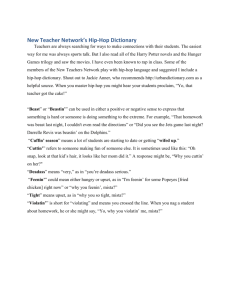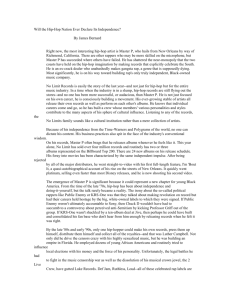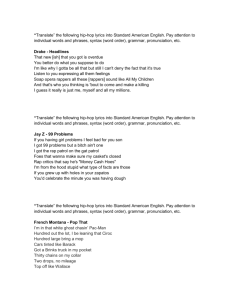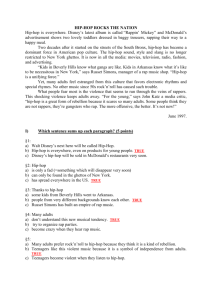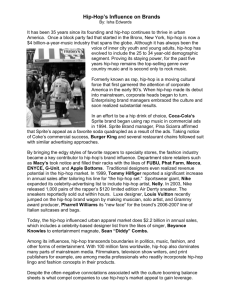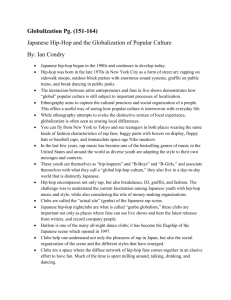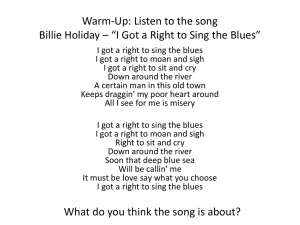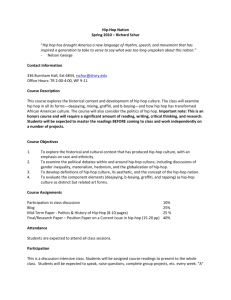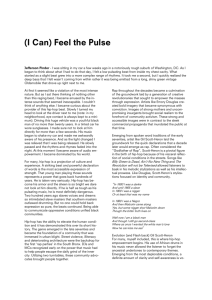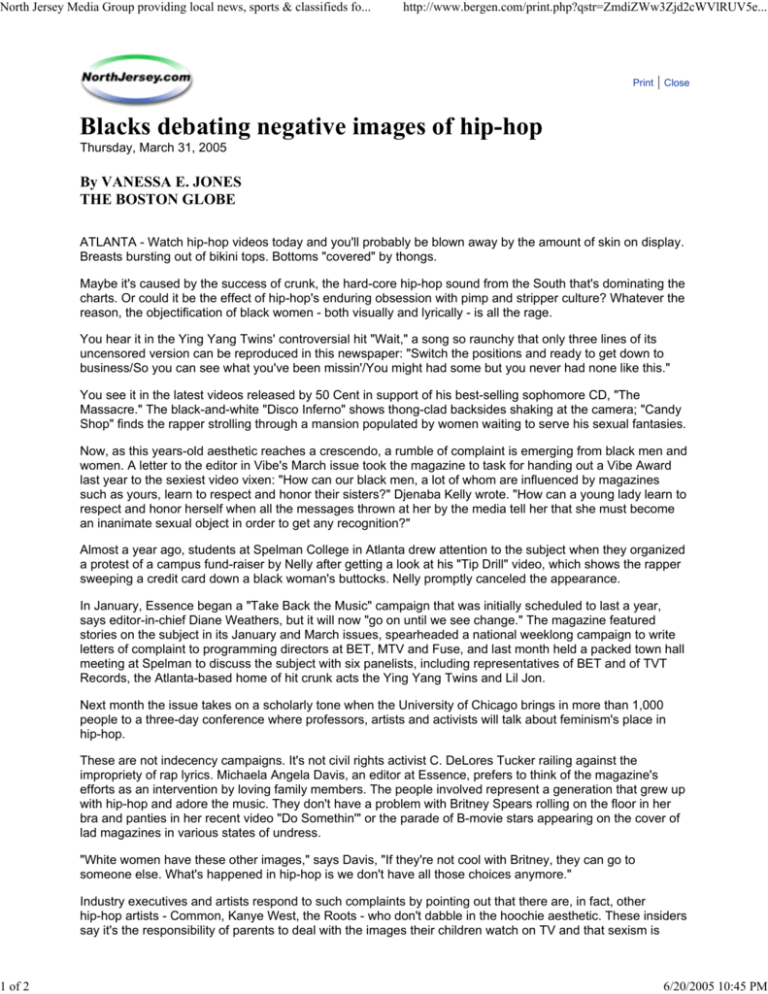
North Jersey Media Group providing local news, sports & classifieds fo...
1 of 2
http://www.bergen.com/print.php?qstr=ZmdiZWw3Zjd2cWVlRUV5e...
Print
| Close
Blacks debating negative images of hip-hop
Thursday, March 31, 2005
By VANESSA E. JONES
THE BOSTON GLOBE
ATLANTA - Watch hip-hop videos today and you'll probably be blown away by the amount of skin on display.
Breasts bursting out of bikini tops. Bottoms "covered" by thongs.
Maybe it's caused by the success of crunk, the hard-core hip-hop sound from the South that's dominating the
charts. Or could it be the effect of hip-hop's enduring obsession with pimp and stripper culture? Whatever the
reason, the objectification of black women - both visually and lyrically - is all the rage.
You hear it in the Ying Yang Twins' controversial hit "Wait," a song so raunchy that only three lines of its
uncensored version can be reproduced in this newspaper: "Switch the positions and ready to get down to
business/So you can see what you've been missin'/You might had some but you never had none like this."
You see it in the latest videos released by 50 Cent in support of his best-selling sophomore CD, "The
Massacre." The black-and-white "Disco Inferno" shows thong-clad backsides shaking at the camera; "Candy
Shop" finds the rapper strolling through a mansion populated by women waiting to serve his sexual fantasies.
Now, as this years-old aesthetic reaches a crescendo, a rumble of complaint is emerging from black men and
women. A letter to the editor in Vibe's March issue took the magazine to task for handing out a Vibe Award
last year to the sexiest video vixen: "How can our black men, a lot of whom are influenced by magazines
such as yours, learn to respect and honor their sisters?" Djenaba Kelly wrote. "How can a young lady learn to
respect and honor herself when all the messages thrown at her by the media tell her that she must become
an inanimate sexual object in order to get any recognition?"
Almost a year ago, students at Spelman College in Atlanta drew attention to the subject when they organized
a protest of a campus fund-raiser by Nelly after getting a look at his "Tip Drill" video, which shows the rapper
sweeping a credit card down a black woman's buttocks. Nelly promptly canceled the appearance.
In January, Essence began a "Take Back the Music" campaign that was initially scheduled to last a year,
says editor-in-chief Diane Weathers, but it will now "go on until we see change." The magazine featured
stories on the subject in its January and March issues, spearheaded a national weeklong campaign to write
letters of complaint to programming directors at BET, MTV and Fuse, and last month held a packed town hall
meeting at Spelman to discuss the subject with six panelists, including representatives of BET and of TVT
Records, the Atlanta-based home of hit crunk acts the Ying Yang Twins and Lil Jon.
Next month the issue takes on a scholarly tone when the University of Chicago brings in more than 1,000
people to a three-day conference where professors, artists and activists will talk about feminism's place in
hip-hop.
These are not indecency campaigns. It's not civil rights activist C. DeLores Tucker railing against the
impropriety of rap lyrics. Michaela Angela Davis, an editor at Essence, prefers to think of the magazine's
efforts as an intervention by loving family members. The people involved represent a generation that grew up
with hip-hop and adore the music. They don't have a problem with Britney Spears rolling on the floor in her
bra and panties in her recent video "Do Somethin'" or the parade of B-movie stars appearing on the cover of
lad magazines in various states of undress.
"White women have these other images," says Davis, "If they're not cool with Britney, they can go to
someone else. What's happened in hip-hop is we don't have all those choices anymore."
Industry executives and artists respond to such complaints by pointing out that there are, in fact, other
hip-hop artists - Common, Kanye West, the Roots - who don't dabble in the hoochie aesthetic. These insiders
say it's the responsibility of parents to deal with the images their children watch on TV and that sexism is
6/20/2005 10:45 PM
North Jersey Media Group providing local news, sports & classifieds fo...
2 of 2
http://www.bergen.com/print.php?qstr=ZmdiZWw3Zjd2cWVlRUV5e...
pervasive in society in general.
Those answers don't satisfy their critics.
"While there's sexism out there in society," says Cathy J. Cohen, director of the University of Chicago's
Center for the Study of Race, Politics and Culture, which is organizing the Feminism and Hip Hop
Conference taking place April 7-9, "we have to be especially concerned with media images of black women
because, in fact, that's how most people understand and interact with black communities. We live in a
segregated society. People generally don't interact. They may work with someone of a different race, but they
don't socialize or go to church with people of a different race. So the way you get introduced to other racial
groups is often through the media."
The hip-hop videos are troublesome, critics say, because they reinforce stereotypes about black women that
have persisted for centuries. The potential political implications are huge. "Hypersexual deviance," says
Tricia Rose, author of the seminal 2003 book on black women's sexuality "Longing to Tell" and a scheduled
participant in the University of Chicago event, "has been associated with black women historically for a very
long time. It's tied to the logic that cuts welfare policies for black women, right? The idea that they're
promiscuous, they're irresponsible, or they're emasculating - all of those kinds of representations impact
policies."
And the fallout does not just occur in the United States. Because of the artists' worldwide popularity, their
messages affect minds globally. When Davis worked as editor of the now-defunct magazine Honey, one of
her writers wrote about her experience as an exchange student in Spain where, Davis says, she was
"solicited for sex just because she's a black American."
It wasn't always this way. When women appeared in hip-hop videos in the 1980s and early '90s, they were
often clad in oversize pants and tops with some abs exposed here or some bare legs there to add some
sexual heat. At that time, NWA, Ice-T and Public Enemy talked about police brutality and the limited horizons
for young blacks living in the inner city.
"The politics of hip-hop during that time," said activist and former Vibe scribe Kevin Powell, at the Essence
event in Atlanta, "terrified the white power structure."
So what happened? Another Essence panelist, MC Lyte, suggested that the shift began as hip-hop made the
leap into the mainstream around 1992 or 1993. "There's some law," said Lyte, a respected female rapper
from hip-hop's early years. "They say after 500,000 CDs, you're selling to a whole different realm. Now you
are selling records to young white boys. I think once the corporations understood that, that was their time to
come in and take control of it. Once the control was taken away, then came all of the nonsense."
Take the videos at their basic essence, and there's no question whom they're marketed to. "We know that
men love skin and cars and gadgets," says Davis. "And that's what these videos have."
But the imagery takes the sexual element to such a degree that the plaintive question on one Spelman
freshman's lips during the Essence event was "Why are y'all so mad? Why are we women vicious and all
these things? What did we do?"
Panelist Bryan Leach, vice president of A&R at TVT Records, insisted that the cause isn't sexism. "There are
a lot of artists who think this is just a song. I know Lil Jon, the Ying Yang Twins, a lot of these artists,
personally, and they don't walk around every day thinking, 'I hate women.'"
Lyte responded, "So they're selling us out, but they're just putting on an act to sell a record." The crowd,
predominantly female with a smattering of men, reacted to her comment by exploding into supportive
applause.
Copyright © 2005 North Jersey Media Group Inc.
Copyright Infringement Notice User Agreement & Privacy Policy
Print
| Close
6/20/2005 10:45 PM

